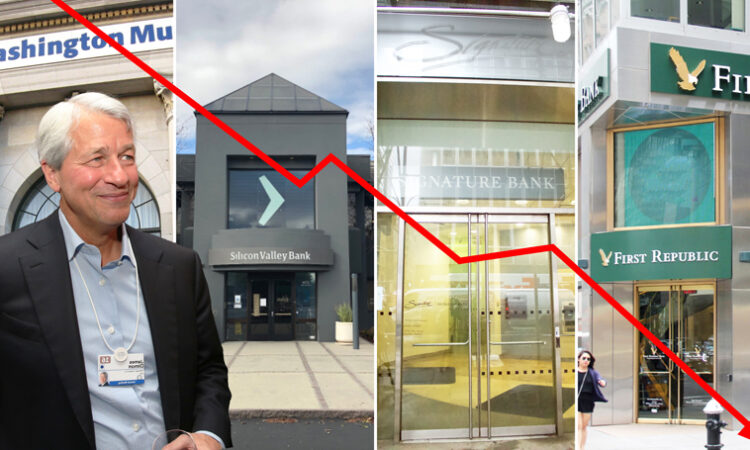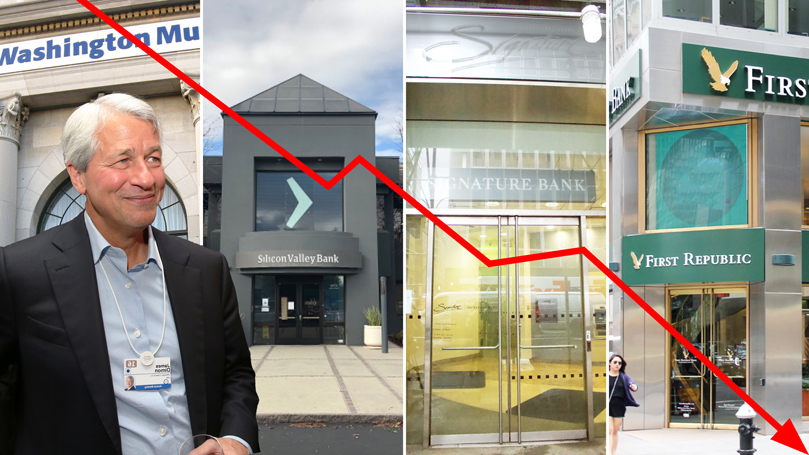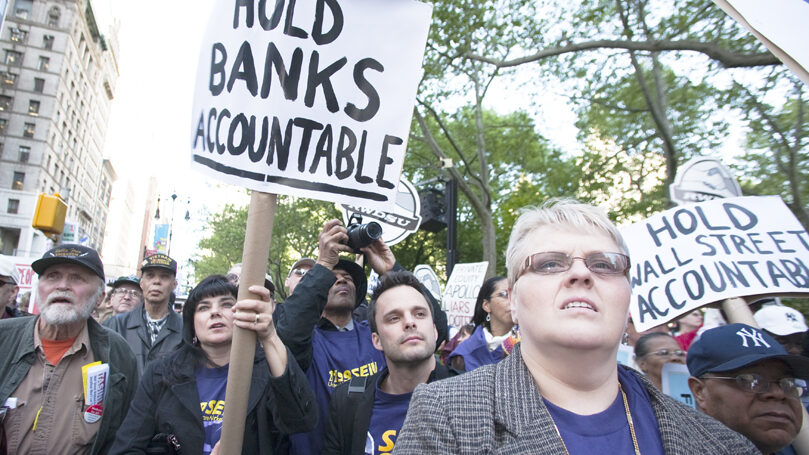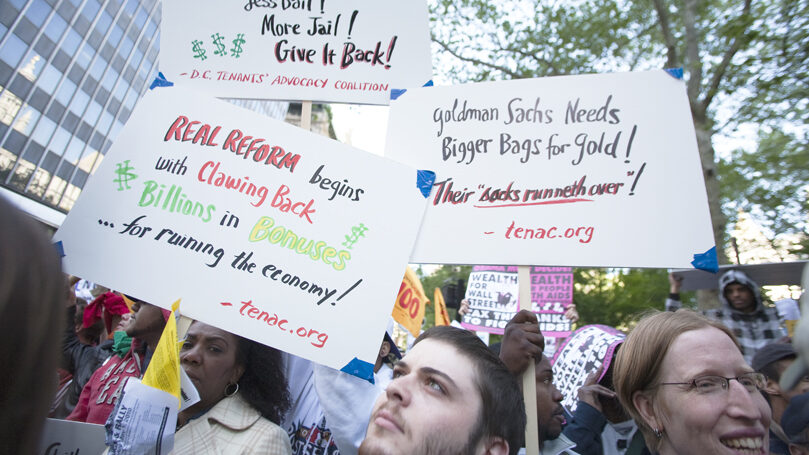

Jaime Dimon, Chair & CEO of JP Morgan Chase, appears to be positioning himself for a “higher calling.” It would surprise no one to hear him mentioned to succeed Janet Yellen as United States Secretary of the Treasury. In a recent Bloomberg interview, Dimon demonstrates he understands the banking crisis as well and intimately as anyone. But the big win for JP Morgan in the deal leaves a stench on his remarks. Few Marxists, for example, will be surprised that the banking crisis worries JP Morgan — the largest bank in the U.S. — less than concerns about weakness in U.S.-dominated geopolitical unity against socialism and communism, or others that do not volunteer to be dominated.
Despite the blatant monopoly capitalist perspective, Dimon offers a mostly sober summary of the different dimensions of the current volatile economic and financial environment.
The interview highlights (my take):
- The remaining price shocks (especially energy and food) stem primarily from the pandemic and that remains the chief supply-side cause of inflation. However, once Dimon concedes the supply-side origin, the FED remedy of forcing a recession to bring down prices caused by shortages of the supply of goods, services and labor makes very little sense. Indeed, it can make matters worse.
- Important components of the supply side shocks are shortages of labor, which are a consequence of tectonic shifts in work roles and participation rates in the pandemic. But how does a need for more labor match up with draconian, cruel and savage treatment of immigrants at the southern border, who are often refugees from countries suffering the wreckage of two centuries of imperialism?
- Dimon blames inflation, in part, on too much pandemic “stimulus” money being used to help keep people alive during the global health crisis.
- The Ukraine war is the chief aggravation of supply pressures — but, according to Dimon, it must be “won.” That sounds like a call for continued escalation.
- The economic Cold War with Russia and China, especially weaponizing the dollar, is having serious blowback.
- The banking crisis in mid-sized banks, from which JP Morgan directly increased its dominant position over the entire financial sector, “should” be over. (That statement may not be that sober.)
How should working class forces respond to all the talk about a financial crisis? Despite inflation, real unemployment has declined to pre-pandemic levels, and real wages are rising at the bottom of wage scales, if still trailing on the median. While the pandemic stimulus has helped increase workers’ bargaining power, that money — over a trillion in commercial and personal checking and savings accounts — is declining fast.
If you are an avid consumer of economic and financial news, you probably spend a lot of time listening to, watching, or reading Bloomberg media. On Bloomberg, indeed on Wall Street, hardly a day goes by without some market trend dancing on the edge of a “crisis.”
Neither the business media, nor the traders, nor the investors, would have an honest argument with Vladimir Lenin’s assertion that the entire capitalist system, after the First World War of colliding capitalist and empire-aspiring powers, was in a general, and systematic crisis.
Wall street investors, however, view the crisis differently than the predominantly wage and salary earners in the public. For them a crisis, like a bank failure or a corporation failure, is an opportunity for another bank’s success, or another corporation’s success. For them, “crisis” is the spark of capitalism’s famed “creative destruction.”
In the recent shutdown of First Republic Bank, for example, all remaining assets (deposits) were purchased at a discounted price by Jamie Dimon’s bank. The FDIC picked up the lion’s share of the “losses,” or liabilities, to First Republic creditors and bondholders.
Privatize the gains, socialize the losses.
JP Morgan now holds more than 10 percent of all U.S. deposits. This kind of banking crisis resolution, even if it is not (yet) as severe as in 2008, is significantly advancing wealth and financial services concentration. Even if it staves off further bank runs, if it conceals even more egregious frauds in the “uninsured” banking business, the explosion will be even bigger down the road than before.

Asked in the interview, “Is your bank too big to fail?” Dimon responds, “I don’t know what that means.” Indeed. The question is asking, in essence, “If your bank fails, will the public suffer serious, uninsured, perhaps irreparable harm?” But such a meaning is inherently meaningless to a firm believer in — and beneficiary of — the “creative destruction” of capitalism. Instead, Dimon insists “we don’t need a comprehensive solution,” bemoaning the fact that with more regulations, rules and requirements “things are going to get worse for banks.”
Crashes do not concern Dimon. “I would take a mild recession happily right now. I am far more concerned about geopolitics.” Then he says that the U.S., with a per capita GDP three times higher than China’s and “all the food … and energy we want,” can still dominate China — as long as we “manage ourselves.”
In Dimon’s view, a real-estate crash taking down a few banks (whose assets can then be bought cheap by bigger banks) is “normal stuff.” What’s not “normal” are the challenges to U.S. imperialism’s definition of “democracy.”
Despite their fetish for crises, it turns out big banks and investors like to have accurate economic data, wherever possible, so they can pick the winners and losers first, and faster. This is never more true than when dangerous economic, social and political contradictions are moving quickly, and against predictions. The sea of economic, social and political data available for analysis these days is reflecting the turbulence of contending forces, which in turn amplify the turbulence. Here are just a few of these movements from the past 12 months, and the questions they beg, which are not answered in Jamie Dimon’s summary:
- Inflation is a killer when wages don’t keep up. Elementary economics and politics from the American and French revolutions forward demonstrate that bread, or its want, can raise or smash both monarchies and republics. No one in my grocery store is silent on the issue. Try to find any beef, poultry or pork under 5 dollars per pound in West Virginia. It’s souring support for Biden.
- While the pandemic and the Russia–Ukraine war did reduce the supply of labor and energy supply, supply and demand are not the only problem: corporate giants are using their monopoly position to raise prices, simply because they can. As reported by The New Statesman, Starbucks coffee prices are up 11% — and their profits up 19.1%. McDonald’s 17% price hikes also helped boost company revenue. The Restaurant Group has openly planned to make up for people being forced to buy less by increasing prices. Kraft Heinz’ 10% growth was “primarily driven by higher pricing.” There, as in the U.S., inflation has hit food staples the hardest. Given this, why not consider price controls — especially on essential foods and rent? While large companies are stealing back modest wage gains and pandemic stimulus money via price hikes, they can equally be reclaimed by the public through increased taxes on the rich.
- The mass violence, racially driven in many instances, is destroying confidence in all civil institutions.
- Workplace stress is at an historic high, not equalled since before the second world war.

- Profit and investment booms and declines are increasingly anarchic. For example, there are very large variations by economic sector. Huge profits from inflation in fossil fuels are not reinvested there but are poured into tech, into intangibles, or stock buybacks (i.e., back into the owners’ pockets). These are attracting the lion’s share of all private capital. This reflects the increasing influence or bias among investing classes toward either green tech, or assorted gambling manias, over industrials. But it also indicates a reluctance among investors to put more of their money into their own businesses, or independent productive enterprise in general. More economists now are recognizing the accuracy of Marx’s prediction of a long term decline in the rate of profit for productive capitalist enterprise. It also appears that investors prefer investments with firmer government backing or insurances in case of losses. The oil barons remain enriched, despite reduced investment in refining capacity, which also pushes up energy prices. These spread pervasively throughout our “high powered” industrial and technological foundations, and all our public budgets.
- Eventually the “privatize the gains, socialize the losses” approach will bankrupt the country. If a firm is too big to fail, and it fails, why should not a public bank receive the assets and liabilities, instead of JP Morgan getting the gains? Why not consider nationalization — or at least appointing a public representative to its board of directors — of all “too big to fail” energy corporations and banks.
- Despite optimism about high-tech as “the future,” the tech company business models are turning evermore toward software services and away from the older models of licensing copyrighted software, aka “intellectual property.” The latest movement is the application of AI systems, like OpenAI’s ChatGPT, to vast Internet language resources, including the massive and global profiles the major platforms have on billions of users, and corporations. The business model: OpenAI charges me six 1/100ths of a penny for a roughly 3,000-word prompt and completion service. A new wave of workforce restructuring by AI capabilities is already underway. Many new jobs will be created, and many lost, including in the programming world. (ChatGPT can program in most computer programming languages). It is difficult to see how the control of such vast infrastructure and profiling resources can remain private. In such an environment, it boggles my mind to hear that elections are actually “democratic,” instead of wag-the-dog productions.
- MAGA forces — meaning, especially, their neo-fascist billionaire backers — keep making serious threats to provoke a constitutional crisis over refusal to raise the debt-limit. While their latest efforts failed to obtain cuts to social security and medicare, they did force an increase in work requirements for food stamps, at a time when corporations are also inflating food prices.
- Political deadlocks, fascist extremism, corruption by wealth, and dysfunction are weakening the ability of the government to respond legislatively to either inflation, or recession — the two mandates for which the Federal Reserve is responsible. But as indicated above, the rising threats of inflation and recession have multiple political and economic causes.
- The Fed’s tools are very limited, restricted to setting base interest rates, including effective zero or negative rates, which equates to free cash to banks under stress. It is powerless to stem climate disasters and pandemics; or high-risk Cold War confrontations in pursuit of domination foreign policies. It cannot bring peace or stability to conflict-driven states plundered throughout the age of imperialism.
- The actual effects of adjustments made by the Fed are not usually known until months later. Thus, it is not a reliable guardian against geoeconomic volatility, supply-chain disruptions, bank runs, or the collapse of systematically over- and under-valued, uninsured companies.
- U.S. government securities have long been a last resort and safe haven for banks and large fortunes to park money in stormy markets. What happens to “safe havens” when U.S. government bonds and securities become weaponized (such as barring political adversaries from access to the dollar as a global reserve currency)?
It would be easy, but probably rhetorical, to keep appending various forms of nationalization or “gaining public stakes and controls” to every challenge mentioned above. Can any force within this nation challenge the billionaire oligarchy, which keeps driving the country towards catastrophe in the name of “democracy”? Does any serious challenge really make sense without partial or complete socialization of too-big-to-fail institutions?
The question appears a bit abstract, but maybe less than it used to. When bread disappears, the safe havens do, too. For our working class and people, asserting the key principles of solidarity — in our workplaces and in the public square — is the only recourse when all help (beyond the realization that “we are our own protection”) evaporates like Puff the Magic Dragon.
Those principles are: bread, equal pay for equal work, useful work for everyone to do, and no one left behind. Not for nothing, these same principles define the culture that must dominate any successful strike.
Images: Former Dime Savings Bank branch (public domain) / The headquarters of Silicon Valley Bank by Minh Nguyễn (CC BY-SA 4.0) / Signature bank storefront by SWinxy (CC BY-SA 4.0) / First Republic Bank by Can Pac Swire (CC BY-NC 2.0) / Becky Quick and Jamie Dimon (cropped) by Financial Times (CC BY 2.0); Thousands protest banks on Wall Street by SEIU (CC BY-NC-SA 2.0); Thousands protest banks on Wall Street by SEIU (CC BY-NC-SA 2.0)





